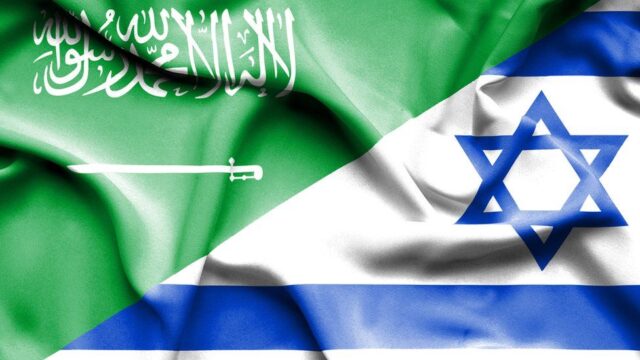The arrival in Washington of Ron Dermer, a key strategic advisor to Israel’s Prime Minister Benjamin Netanyahu, suggests that after negotiating terms for Israel with Saudi Arabia – a two-way parlay on a three-country deal – Washington may be asking Israel for input. Or Israel may be demanding input. In either case, the parties are performing a dance that will play out over the next several months – deal or no deal, this way or that way, for better or for worse.
The original Saudi parameters were clear: a civilian nuclear program and “ironclad” US security guarantees against Iran. American interests were progress toward a Palestinian state and pushing the Saudis away from their increasingly close relations with China – including a guarantee to denominate oil sales in dollars rather than China’s preferred yuan. Oh, and the US wants bases in Saudi Arabia.
While Israel will not openly agree to any further nuclearization in the region, no one there was jumping the gun.
Foreign Minister Eli Cohen compared the Saudi situation with that of South Korea, next door to a hostile and nuclear North, but without an indigenous nuclear capability. “The US defense commitment acts as South Korea’s deterrent against Northern aggression,” he said. “A comparable American defense pledge could reassure Middle Eastern nations, primarily Saudi Arabia and the Gulf states.” National Security Adviser Tzachi Hanegbi said he had “full confidence” that “whatever the United States will decide” will take Israel’s security needs into consideration.
The Saudis, although at odds with the PA over issues of corruption and more, appeared willing to consider the issue. Insiders note that the PA was asked what its goals were. The response, according to some, was a list of unattainables. The Saudis responded by naming its ambassador to Jordan, Naif bin Bandar Al-Sudairi, “Non-resident ambassador to the State of Palestine and Consul General in Jerusalem.”
The Israelis were sanguine. Cohen said Israel was “aware of” Saudi Arabia’s planned appointment, but “they didn’t coordinate with us, and they didn’t have to coordinate with us. The Saudis wanted to send a message to the Palestinians that they didn’t forget them.”
The Saudis “didn’t have to” coordinate because there is no Palestinian Consulate in Jerusalem because Israel would be required to approve it. And Israel will not. The government in Jerusalem rejected a US suggestion for a US consulate on the eastern side of the city. What it won’t do for its best friend and historic patron, surely it won’t do it for a country – Saudi Arabia – with which it has no relations.
It always comes down to money. Since the beginning of the Biden administration, money has flowed to the PA. According to USAID, “Between September 2021-2024 USAID will provide over $500 million in programming.” There is an additional “$33 million for UNRWA… and an additional $5.5 million to humanitarian partners.” This, said Secretary of State Antony Blinken in a statement, “is in addition to the more than $250 million… announced in March and April, bringing planned U.S. assistance to more than $360 million.” In 2022. Only.
Netanyahu’s response was that the Palestinian issue is “sort of a check box. You have to check it to say you’re doing it. Is that what’s being said in the corridors? Is that what’s being said in discreet negotiations? The answer is a lot less than you think.”
The PM reiterated his long-standing formula for the Palestinians. They should “have all the powers to govern themselves and none of the powers to threaten Israel. This means that in whatever final peace settlement we have with the Palestinians, Israel has the overriding security power in the entire area — ours and theirs.”
No specific concessions; no specific rejections.
This is all wiggling. The odds are still slim. The Biden administration does still, in fact, consider Saudi Crown Prince Mohammad bin Sultan (MbS) a “pariah” and an uncomfortable partner; MbS isn’t fond of the Biden people either. There is less friendliness and more slapping at Jerusalem by Washington, and Jerusalem is increasingly irritated by what it perceives as the Biden administration’s interference in Israel’s domestic affairs.
But that is about the Biden administration.
In the meantime, the Saudi sovereign wealth fund has been investing in Israeli startup companies, according to Globes, and an Israeli technology company reportedly provided its services to help the kingdom define elements of its Vision 2030. In August, an Israeli-founded smart energy tech firm was reported set to work with Riyadh to deploy solar energy in the kingdom. The Wall Street Journal reported that Israeli businessmen addressed Saudi Arabia’s flagship investment conference, “in a clear but subtle sign of burgeoning commercial ties and Israel’s growing acceptance in the kingdom despite the two countries still having no formal relations.”
And that, it seems, would sum up the positive side of this three-way dance.


